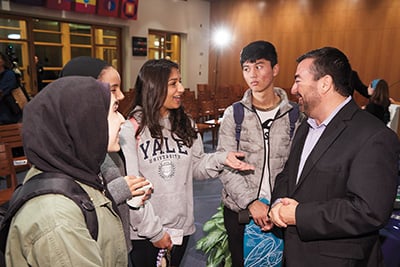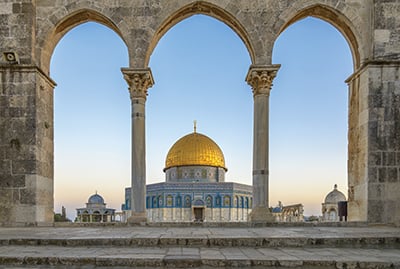
Top Photo: Rabbi Dr. Erin Leib Smokler, Professor Carol Bakhos and Imam Abdullah Antepli
was the first question posed to a filled lecture hall at“Jerusalem: One City, Three Faith Perspectives.” This hour-long panel discussion — a groundbreaking collaboration between STM, the Joseph Slifka Center for Jewish Life at Yale, the Muslim Student Association at Yale and the Interfaith Club at Yale Divinity School — addressed this question through compelling interfaith dialogue about “the importance of Jerusalem in Judaism Christianity and Islam.”
The expert panelists, Rabbi Dr. Erin Leib Smokler, fromNew York rabbinical school Yeshivat Maharat; Professor Carol Bakhos, from UCLA; and Imam Abdullah Antepli ofDuke University, opened the discussion with remarks about what Jerusalem means to them, and their respective religions, both as scholars and people of faith. Rabbi Erin’s beautiful poetic take on Jerusalem emphasized the dual consciousness that the city inherits from Jewish tradition, specifically in the Babylonian Talmud, the central text of Rabbinic Judaism. On one hand, according to Rabbi Erin, there is heavenly Jerusalem, the ideal Jerusalem — one that sparks wonder and brings you closer to God. On the other, there is earthly Jerusalem, the real Jerusalem — one that is tainted by the imperfections, conflict and complications of the world.
Professor Bakhos expressed the importance of Jerusalem to Christianity by outlining three points: the historical dimension as the city Jesus lived in, the teleological aspect as the dual, heavenly-earthly city which fulfilled New Testament scripture, and the mythic dimension, which marks Jerusalem as city with layers of spiritual meaning.
Imam Abdullah’s opening remarks, on the other hand, treatedJerusalem as the place where the Prophet Muhammad journeyed to see God, a place where all Muslims can and have done the same for centuries. In Imam Abdullah’s words,Jerusalem is “a spiritual telescope where you put your eyes to see and make sense of the heavens,” but, as Rabbi Erin pointed out, it is also a place full of contradictions complicated by political histories that appear to dominate the narrative of this multi-faith city.

Students speak with Imam Abdullah Antepli after the panel discussion.
Following the opening remarks, Abdul-Rehman Malik, lecturer at the Yale Divinity School and Program Coordinator at Yale University’s Council on Middle East Studies, moderated a discussion between the three panelists, who answered questions that members from the audience. A delicious kosher dinner and student reception with the panelists followed the event, which encouraged continued interfaith dialogue.

As Catholics in a globalized society, it is important we recognize and understand other traditions, especially those which enrich the complex holiness of Jerusalem, the city where Christ lived, died and was resurrected. “Jerusalem: One City, Three Faith Perspectives” left me, among many others in the audience, with the desire to visit. Amidst conflict and violence, we must strive to understand Jerusalem and its people—beginning with interfaith dialogue—in order to, as Imam Abdullah stated, “come back to Jerusalem worthier and more deserving.” And that is what we can do.